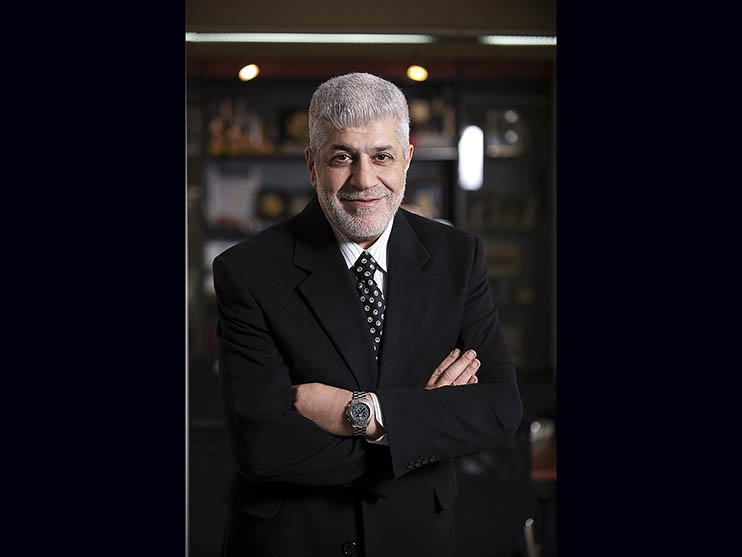Industry Talk
Ramsay Najjar on Effective Political Campaigning
April 28, 2018

Most of the campaigns this year are very straightforward, with an easy memorable punchline giving the target voters a reason why, this time, they should vote for a candidate or a party. Do you think this is an effective strategy that can have an impact on how voters vote?
A catchy slogan or a memorable punchline is certainly not enough to influence citizens and their voting pattern, especially if not tied to a larger campaign strategy that seeks to substantiate or support the claim made. In fact, with more than 900 candidates running for office in these elections, it has become something of a running joke to compare the different campaign slogans and some of their “interesting” claims, such as focusing on loyalty when the candidate himself chose to forgo his allies, at the last minute, and switch to a diametrically opposed list only to try to secure a seat on what he believes to be a winning ticket.
As such, beyond focusing on the slogan alone, an effective strategy will require a clear positioning for the candidate or the list, a well-developed and targeted narrative that corroborates the aspired positioning, and an effective media plan that uses a well-balanced mix of available platforms.
“A campaign can be eye-catching, memorable, and have a high recall factor, yet it might not be strategically relevant to the party or the candidate in terms of its positioning, equity, or perceived image.“
How to evaluate a good political campaign?
A good political campaign is one that is based on a clear and comprehensive strategy, away from any improvisation and the prioritization of form over substance.
Particularly, a catchy slogan or an engaging visual alone are certainly not sufficient, whereby a well-defined positioning is key for the candidate or the party to persuade voters and provide a convincing alternative.
Understanding the psyche of voters and influencers and what triggers them is also key, as is exhaustively mapping the political landscape and the campaign and media scene.
A good political campaign requires having a target-specific message platform and a well-defined and multi-platform media plan, whereby through the law of frequency and the use of the adequate channels, candidates can reinforce their positioning and Unique Selling Proposition, similar to any product or brand.
In that sense, media exposure and on-the-ground contact with voters is paramount, whereby name recognition and recall is critical in a cluttered electoral field with over 900 candidates vying for 128 seats.
Among all the political campaigns launched so far, is there any strong concept that caught your attention?
It all depends on how we define a “strong concept”. A campaign can be eye-catching, memorable, and have a high recall factor, yet it might not be strategically relevant to the party or the candidate in terms of its positioning, equity, or perceived image.
In fact, however creatively well-executed a campaign is, it cannot be dissociated from the message it tries to convey. For example, candidates cannot call for change when they themselves have been in power for many years. In that sense, despite any design, visualization, or copywriting prowess, the campaign is bound to fail because of the disconnect between its message and the political and social reality on the ground. Obama’s “Yes we can” campaign, in contrast, succeeded because it built on the expectations of social and political changes to come, most notably the ability to elect the first black President and a candidate that would break from the war-waving tradition inherited from eight years of a George W Presidency.
On the flip side, I believe some campaigns were to the point in terms of their positioning of the party or candidate, yet might have strayed in their executional direction by relying on a symbolism that is either culturally questionable or figuratively inaccurate. Others still did well in capitalizing on social media to reach young voters and outdoor campaigns to get their message across to the largest segment of constituents.
To give credit where credit is due, we have seen some campaigns with some creative copywriting twists, yet the fact that alliances are still in the making at the time of writing this piece makes it somewhat early to be able to truly assess the campaigns and to single out the most successful ones, in the larger definition of the term.
“Slogans that rhyme or play on words are arguably appealing, and there have been a few of them in this campaign so far, yet their ability to persuade remains doubtful if not tied to a more complete political campaign strategy. “
Which is the most persuasive political campaign or/and slogan you've seen so far?
The fact that most political parties have, by and large, done little to change things for the better in Lebanon, it becomes particularly hard for them to try to persuade voters that they will now be able to do so, after years of being in or sharing power.
Having said that, civil society groups have an opportunity to leverage the discontent of voters vis-à-vis established parties, through proper communication, granted that they elevate themselves beyond their differences and offer a unified front, something that they have yet to do.
Slogans that rhyme or play on words are arguably appealing, and there have been a few of them in this campaign so far, yet their ability to persuade remains doubtful if not tied to a more complete political campaign strategy.
Moreover, for a campaign to be persuasive, it needs to be coherent and cohesive, in the sense that the media ads and other communication collateral need to be in sync with the discourse and political positions of the candidate. As most candidates have yet to disclose their agendas and electoral programs, judging the compatibility and persuasiveness of the campaigns at this time remains largely incomplete and difficult.
Do you think citizens are inclined to update their attitudes/votes in response to political campaign messaging?
From John F. Kennedy to Barack Obama, Donald Trump, François Hollande, and François Mitterrand, to name a few of the better known elected officials, political campaigns have proven in the last few decades, and without a shadow of a doubt, their ability to change the game and to turn underdogs into winning candidates.
Yet proclaiming that citizens are inclined to update their votes in response to political campaign messaging requires first defining the latter concept and the extent to which the desired impact can be broad.
In fact, if “political campaign messaging” is defined in its narrower sense as reflecting the spoken or written narrative and message platform of the candidate, then attributing any shifts in voter behavior solely to it is debatable at best, except in the cases of an extremist rhetoric that panders to the fears, insecurities, and prejudices of constituents.
However, once “political campaign messaging” is defined in its broader sense as reflecting the positioning, reputational and perceptual equity, non-verbal communication, and actual agenda and narrative of the candidate, then its impact can no longer be understated. Said differently, voters are persuaded not only through the promises or positions taken by candidates on certain issues, but also through the subconscious image that they formulate of the candidate based on his or her perceived charisma, mannerism, leadership traits, media skills, and other emotional associations or attributes they conjure.
In the 2016 US Presidential elections, many voters turned away from Hillary Clinton because she projected an image of being dishonest (which Donald Trump admittedly brilliantly leveraged by repeatedly calling her “crooked Hillary”), while millions supported Bernie Sanders with his “grandfatherly” and amiable demeanor.
Though perhaps the most notable historical example is that of the Nixon vs. Kennedy Presidential campaign of 1960, where the dashing looks and physical language and ease of JFK in the debates made those who watched them on television to declare him the winner, while those who listened to the debates over the radio chose Nixon as the clear favorite, proving that the art of persuasion and influencing voters goes far beyond mere argumentation and rhetoric.
The second parameter to account for, on the other hand, is the target audience and the extent to which “political campaign messaging”, even in its broader definition, can get people to change their vote.
Admittedly, most experts agree that political campaigning is all about reaching out to and influencing the undecided, the non-committed, and the swing voters. In other words, its degree of success hinges on its ability to engage the generally small percentage of the population that is politically neutral or “on the fence”.
In Lebanon’s 2009 Parliamentary elections, this constituted those who were neither staunchly March 8 nor March 14, or that were disillusioned with both factions.
In the 2018 elections, and despite the often illogical alliances under way, the hardline Aounist will still vote for the FPM candidate, the LF supporter for the LF candidate, and so on. The challenge for candidates will hence be to tap into those on the fringes of the political parties or that have lost faith in the incumbent Parliamentarians and their political discourse.
What is likely to play a key role in shaping vote choice?
A number of elements tend to converge and influence a voter’s choice, some of which are communication-related, while others are politically-related or personal/family-related.
While the latter two elements are hard to impact (voters will generally still vote for their family members or the political parties to which they belong), candidates can only hope to win over the remaining “uncommitted” constituents by rightfully playing the communication card, and that by having a strategy in place that capitalizes on various venues, channels, and initiatives, ranging from traditional and social media, to townhall meetings and campaign rallies, media interviews, door-to-door campaigning (in its Lebanese version of meeting voters and offering them favors), etc. Unfortunately, the debates format is still alien to us, despite it being a major influence in elections abroad, as we have seen recently in the US and French elections (when Le Pen tanked in her televised debate with Macron, costing her a shot at the Presidency).
A ton of money is spent every election cycle on advertising campaigns, which are all designed to persuade voters. Is all this spending largely ineffective and an absolute waste?
It is too simplistic to say that all the spending made is ineffective and an absolute waste. Campaigns sometimes galvanize voters and get them to actually cast their vote, which is critical in the mathematical computations of candidates, especially amid an election law such as that of this year.
Add to that, with so many candidates running, often from the same family, it becomes important for candidates to spend on media campaigns in order to get citizens to know that they are actually running, while also ensuring that constituents avoid any confusion in names, political affiliations, or lists. This is especially true since the faces of the candidates will be shown on the electoral ballots, allowing voters to choose who to cast their preferential vote for by ticking next to the name and picture of the candidate.
Yet it should be noted that the advertising spending phenomena is not unique to Lebanon, whereby such a trend is common to most countries, proving the continued and growing influence of the media, be it traditional or social.














